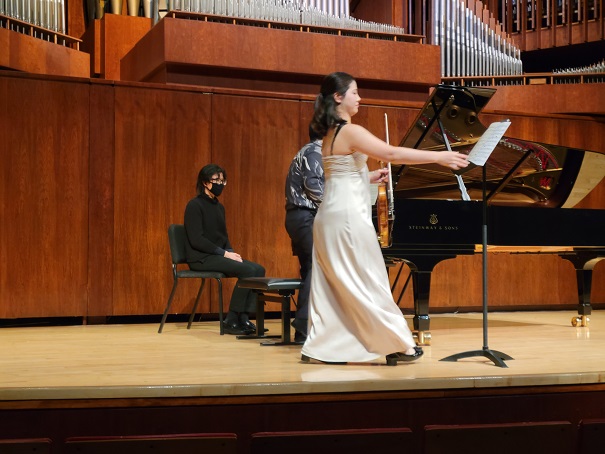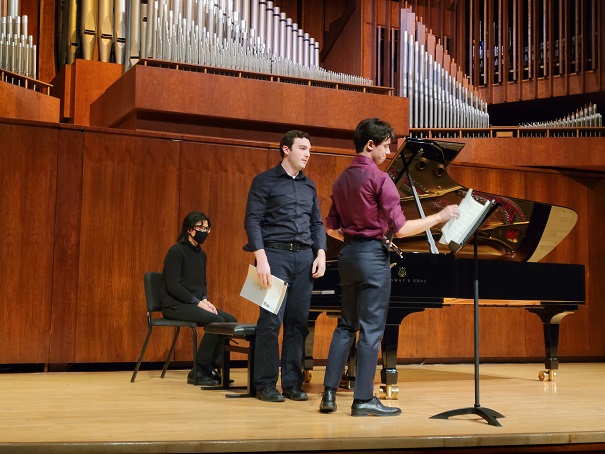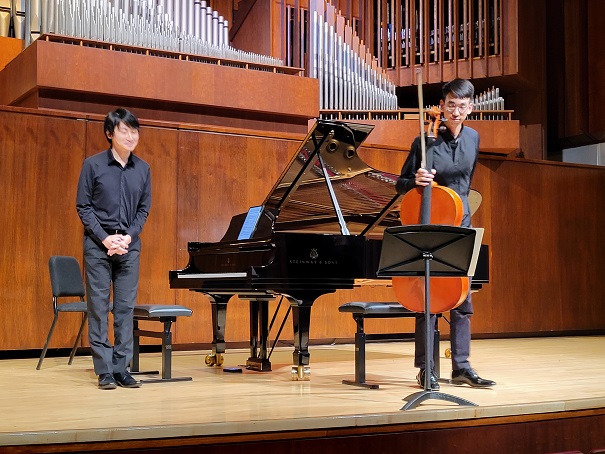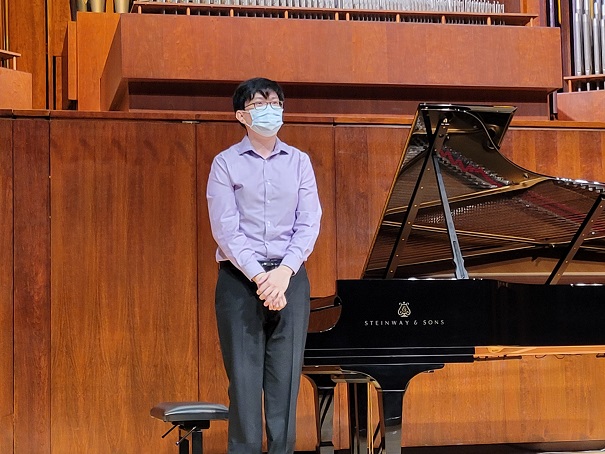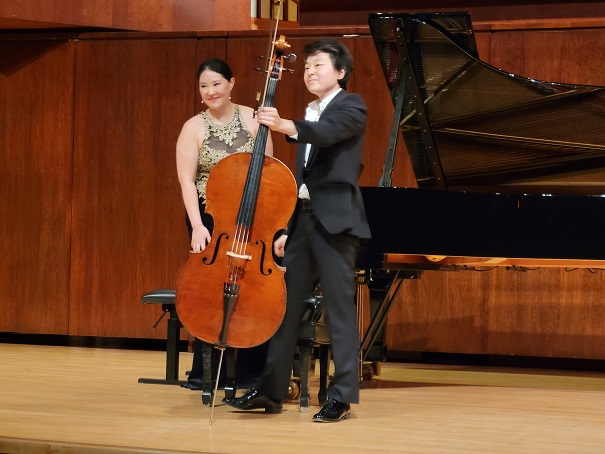Concert Diary: Free Concerts at the Juilliard School
November 22, 2021
New York, N.Y.
Besides preserving an essential component of civilization, music schools also benefit local communities with free concerts. Check out the Performance Calendar of the Juilliard School, and you’ll see concerts open to the public every day, and very often more than one. Some of these concerts require tickets that cost a little money; some require tickets that are free, but for others, you just show up at the Juilliard School at 155 West 65th Street and walk in — following a check of your vaccination card, of course, and possibly letting a security guard know why you’re there.
Last Wednesday, I attended Sonatenabend CCXXIII, the 223rd “sonata evening” (the third for this season) “presented by the Collaborative Piano Department” in the Paul Recital Hall, where we saw performances of the Debussy Violin Sonata, a Hindemith Viola Sonata, and a Brahms Cello Sonata.
Among my favorite chamber music are the three sonatas that Claude Debussy composed right before his death in 1918. The Sonata for Violin and Piano was his last completed work, and it’s a marvel. I was only able to get one photo after violinist Mitsuru Yonezaki’s fluidly lyrical performance, and not quite managing to get pianist Yihao Zhou in the picture:
Paul Hindemith wrote his first Viola Sonata in 1919 while still in his mid-20s. It was published as part of his Opus 11, which also included two violin sonatas, a cello sonata, and sonatas for solo violin and solo viola. Compared with the Debussy Violin Sonata from about the same time, Hindemith is more traditional in his melodies, harmonies, and rhythms, although structurally inventive: The second movement is a theme and variations, and the variations continue in the finale. Here are pianist Sean Juhl and violist Benjamin Pawlak:
The third sonata jumped back a half century in time for the first of the two exquisite Brahms Cello Sonatas, wonderfully played by Tomsen Su on cello and Taketo Kataoka on piano:
Two days later, I saw two free recitals in Paul Recital Hall, one at 6:00 and the other at 8:30. Both were about an hour long and “presented as partial fulfillment for the requirements of the Doctor of Musical Arts Degree.”
Pianist TianYi Li began his program with the solemn haunting Ballade of Finnish composer Kaija Saariaho, dating from 2005. Afterwards TianYi Li spoke to the audience a bit, noting that he only recognized late in the planning for this recital that he had chosen several sad and mournful works, perhaps reflecting the ordeals for musical education and performance over the past few years, but hoping that the last few moments of the concert would represent a transformation into better times.
Next up in TianYi Li’s recital was a Bach work I probably hadn’t listened to in decades, and which I likely didn’t appreciate much in my younger Bach-drenched years. This was the Aria and 10 Variations in the Italian Manner (BWV 989), in which the theme returns at the end, somewhat like the Goldberg Variations but here in a somewhat transformed state. This is quite beautiful music although not exactly happy!
A big work followed: Chopin’s Piano Sonata No. 3, which is rather gloomy in the opening Allegro, in which melodies struggle to emerge from dark passages. By the finale, however, we get a sense of happiness.
TianYi Li ended his recital with a short work by Nikolai Kapustin, a Russian composer who died just last year at the age of 82. Kapustin was big jazz fan, often incorporating jazz into his other music, include the Concert Etude in D Major (Op. 40, No. 5), appropriately entitled “Raillery,” in which TianYi Li revealed all the humor and hope for the future. Here he is during enthusiastic curtain calls:
The recital later that Friday evening was cellist Yi Qun Xu with a program that stretched over the centuries, beginning with Luigi Boccherini’s engaging and witty Sonata for Cello and Piano in B-Flat Major (G. 8) and continuing with a large chunk of the sixth of Bach’s Suite for Solo Cello, with its gorgeous Allemande.
Yi Qun Xu continued with more recent music, beginning with the microtonal explorations of Alexander Johnson’s Evening Prary for Piano and Cello of 2021 (a composer and work I was unfamiliar with), the ever-popular Songs My Mother Taught me of Antonín Dvořák, and concluding with another cellist / composer I’m not familiar with: Adrien-François Servais and his arpeggio-laden Etude No. 4.
Here is Yi Qun Xu during curtain calls with her accompanist Yoon Lee:
